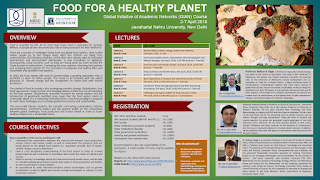Food for Healthy Planet: Global Initiative of Academic Networks (GIAN) Course
2-7 April 2018
Jawaharlal Nehru University, New Delhi
Foreign Faculty: Prof. Mohan B Singh, Australia
Host Faculty: Prof. Ashwani Pareek, SLS; Dr. Rajbeer Singh, CSSP, SSS
OVERVIEW
Food is essential for life. At its most basic level, food is necessary for survival. Millions of people all over the world also rely on food production for their livelihood. There are a number of challenges facing local and global food systems. Close to 800 million people go to bed hungry every night and children are dying from undernutrition and infectious diseases. At the same time obesity, with its associated over-nutrition and micro-nutrient deficiencies, is now considered an epidemic. Consequently, many countries such as India are facing what has been termed the 'triple burden of malnutrition'. Combating the issue requires reforming food policies and reshaping food systems for the promotion of adequate and healthy diets and sustainable and equitable food systems. In 2050, the food system will need to accommodate a growing population that is predicted to reach 10 billion people. This needs to be achieved with the added pressures of climate change and the competition for arable land with biofuel production. The context of food in society is also undergoing constant change. Globalization, free trade agreements, rising incomes and changing dietary preferences are all impacting on the food system. Furthermore, consumer concerns for animal welfare and the introduction of genetically modified crops mean that the food system needs to continually adapt. It is a commonly held belief that a new food paradigm is required to meet these challenges and to achieve global food security and sustainability. This course will educate students, the scientific community, policymakers, industry representatives, community leaders and the general public on the connections between global challenges, food production and human health in order to foster healthy solutions for a sustainable future.
COURSE OBJECTIVES
Upon completion of the course, participants will:
- Understand the connections between the natural environment, food production, energy choices and human health, as well as understand the pressures that are being placed on the global food system (i.e. population growth, lack of equity, climate change, resource depletion).
- Have a cross disciplinary understanding of the food system in order to provide broad expertise and contribute to innovation that meets the needs of industry and society.
- Build on society's knowledge about the food-environment-health nexus, and be able to critically evaluate government policies that relate to food production and health, as well as participate in policy debate.
- Be empowered to make informed decisions about technologies such as genetic modification as well as digital and remote sensing technologies in relation to food production systems.
Who Should Attend?
- Students (all levels) and faculty from recognized academic and technical institutions.
- Executives, engineers and researchers from manufacturing, services and government organizations including R&D laboratories.

No comments:
Post a Comment